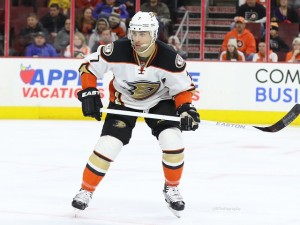Another season, the same problem. The Anaheim Ducks 3-on-3 overtime struggles continue and it doesn’t look like it’s getting any better.
Tuesday’s 3-2 overtime loss to the division rival San Jose Sharks is the latest example of Anaheim’s woes beyond regulation. The Ducks played a strong 60 minutes by focusing on tighter defense following the three-day holiday break. The Ducks controlled the majority of the game, but in the end, the Sharks skated away with the win. Just another point left on the table.
What’s Wrong With Ducks in OT?
The 3-on-3 format has been a problem area for Anaheim ever since it started in the 2015-16 season. The Ducks have lost eight of their nine games that have gone beyond regulation, seven of them in the extra five-minute session.
Following the narrow loss to the Sharks, Ducks forward Andew Cogliano said to the team website:ollowing the narrow loss to the Sharks. “Unfortunately when there’s a mistake, it’s usually because you miss an assignment. You’re counted on to have a guy and that’s your guy. And it seems we can’t get a bounce. There’s no secret around it. It’s man-on-man. You try to keep up the puck and play possession and it seems like we can’t get it done.”
Unfortunately when there’s a mistake, it’s usually because you miss an assignment. You’re counted on to have a guy and that’s your guy. And it seems we can’t get a bounce. There’s no secret around it. It’s man-on-man. You try to keep up the puck and play possession and it seems like we can’t get it done.
Anaheim endured the same difficulties in overtime last season. Simply can’t get the job done. This team continually wins the faceoff, gets a chance but fails to keep possession, cash in or bury its chances. A turnover, missed opportunity in the offensive zone or poor line changes have been the Ducks’ demise.
Not only does it come down to man-on-man, but also breaks down into speed and precision of play. The Ducks wait for that perfect pass and every time fail to convert. For instance, captain and facilitator king Ryan Getzlaf elected to feed Rickard Rakell versus the Sharks, instead of shooting it. And then Sharks rushed down the ice and beat the Ducks.
Individual mistakes and lack of execution cost the Ducks extra points in the first half of the season.
How to Improve the Ducks in OT
The Ducks style of slowing the game down and playing a heavy game works well in 5-on-5 and even strength, but the 3-on-3 format calls for more quickness on your feet.
Anaheim possesses speed and skill in the lineup, but the overtime combinations are missing the quickness. The big bodies can’t always slow the pace on the larger ice in overtime. With more ice available, more mistakes happen, leading to the opposition rushing down the ice, and the Ducks can’t recover.

When there’s a break in the Ducks’ schedule to work on overtime in practice, it’s important Coach Randy Carlyle and his team work on setting up plays during the 3-on-3 and managing the puck more effectively. It’s also up to Carlyle to get the right guys on the ice.
Star players are relied on to eat up precious minutes beyond regulation. But in the Ducks case, their star players aren’t getting the job done. When either Getzlaf or Corey Perry are on the ice, they haven’t been able to bury their chances resulting in opponents odd man rush. Carlyle should roll out more mobile skaters who can get back in time if there’s a turnover or missed opportunity. Cam Fowler, Ryan Kesler, Jakob Silfverberg, Andrew Cogliano and Hampus Lindholm should find more time on the ice in overtime.
Despite the Ducks being winless in the extra five-minute frame and only one victory in the shootout, they sit third in the Pacific Division with 43 points. If they won three of the seven, they would be atop the division.
The points weren’t as critical in the first half of the season, but after the break, the Ducks don’t want to leave any extra point on the table. Anaheim doesn’t want to follow the 2014-15 Los Angeles Kings blueprint of failing to win beyond regulation to fall a point shy of making the playoffs.